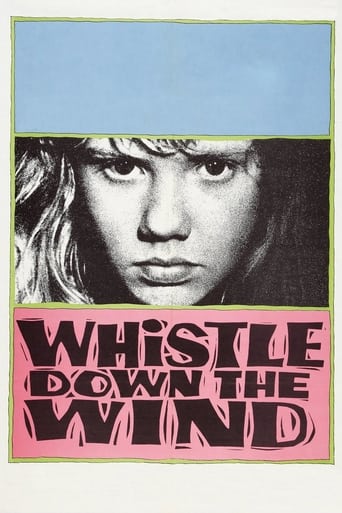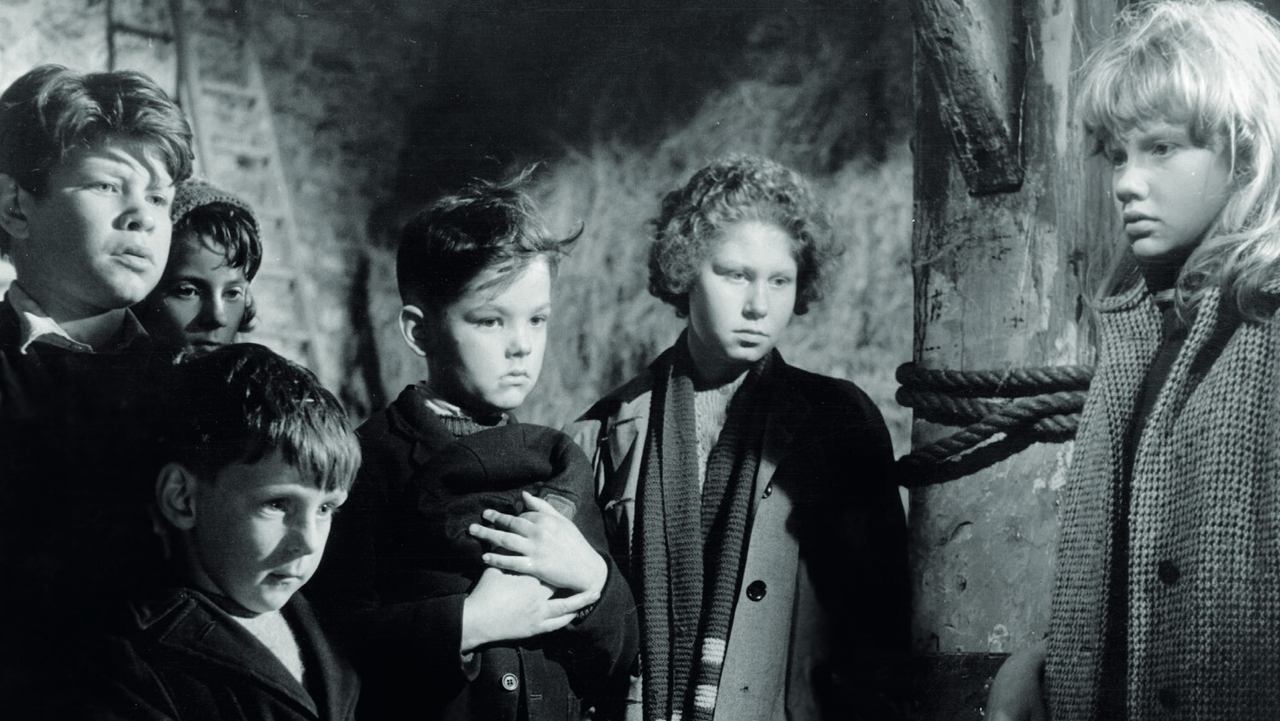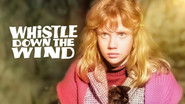lasttimeisaw
The original novel WHISTLE DOWN THE WIND, written in 1959 by Mary Hayley Bell, who is Hayley Mills' mother, so there is little wonder that Hayley is cast as the lead after Disney's POLLYANNA (1960) has catapulted her to stardom and she has become the last person ever to receive a Juvenile Oscar. Also it marks a director debut of Bryan Forbes (SÉANCE ON A WET AFTERNOON 1964).Hayley plays Kathy Bostock, a young schoolgirl living in the farm of Lancashire, with her widowed father (Lee), her younger sister Nan (Holgate) and younger brother Charles (Barnes), as well as their auntie (Wagstaff). Due to a sheer coincidence, Kathy firmly believes a man (Bates) who hides in their barn, is Jesus Christ himself, this is where the story works, thanks to Hayley's superbly credible performance and her mother's well-conceived creation, Kathy is disconcerted by speaking of the truth of Jesus and for fear of being punished for blasphemy, so it is pretty logic for her to be startled by the man's exact presence in the barn and his muttering word "Jesus Christ" before passing out, and believes he is Jesus, arrives for the Second Coming. It potently justifies a rather cockamamie situation, which serves as the cornerstone for the ensuing happenings. Once Kathy is on board, it is not difficult to convince her two younger and more impressionable siblings to believe her words, then a whole bunch of school-kids, deferentially joins them to worship Jesus-in-the- barn.The story fluidly blends children's naiveté with the religious influence, and stimulates sheer zest and excitement in children's endeavour to save Jesus from the intervention of adults, and the man's true identity, a criminal on the lam, consigns a trenchant contradiction into a dichotomy between children's innocence and grown-ups' worldliness, where credulity and blind faith are put to good use by the man, for his own interest, who even menaces the children-friendly trappings with a gun in hand in the final siege, and from A to Z, the film has been deliberately avoiding to address the elephant-in-the-room, so in the end, in Kathy's eyes, it is Jesus who has been captured, not a wanted offender.The three children are the backbone of this rustically beguiling film, Hayley Mills' dogged devotion towards her belief, Diane Holgate's spur-of-the-moment slip and Alan Barnes' fractious mischief, plus his adorable acting-cum-being-himself antics (and he is the one who is telling the truth, although no one takes him seriously), all enliven the relatively small scale of the narrative with immense delight. Alan Bates, only in his second film role, underplays his handsomeness (although the requisite is that he should look at least remotely like J.C.) to foreground the moral ambiguity of his character, a cynical chap, very cagey about his criminal background (supposedly to be a wife murderer according to IMDb), he is a blank paper just plays along with the kids to secure a getaway plan, at one point, viewers are tempted to be ready for something rather ugly will happen, which is foiled regarding to the family-friendly grain, but a sense of remorse is accurately added in his last words? There is no cheesy redemption to facilitate a feel-good ending, and under the coat of a children story, the film in effect, pinpoints how easily religion can corrupt a child's psyche, being a double-edged sword, sometimes it is much sharper than we think, we must wield it cautiously.
rhoda-9
What creates the terribly poignant mood of this movie is the continuing contrasts between Christian teaching and acts, right from the beginning, when the little boy asks the Salvation Army lady if she will take care of the unwanted kitten. She fobs him off with "Jesus will look after it," which of course is worse than useless because it gives the child false hope and makes him feel that loving Jesus is useless too. Couldn't she have made SOME effort to find someone to care for the kitten instead of dispensing vapid promises of universal love? When Hayley Mills asks the Sunday-school teacher what would happen if Jesus came again, the teacher keeps avoiding the question and, when Mills asks, Would they do to him what they did before? is told, they might, because there are still bad people.As the film shows, the adult world is composed of some people who are bad and many others who are thoughtless and insensitive and have no trouble with saying one thing and doing another. They tell the children to be good but are themselves mean-spirited, harsh, and cruel, and would see no conflict between the two. The Hayley Mills character is so touching because she is just reaching the age at which children stop taking things literally and start turning into adults. We want her to believe that the murderer is Jesus, even though it is a lie, because the "real" world she lives in is so soulless.Perhaps the most troubling scene is the one in which the local bully, a boy not much older or bigger than the other children, knocks one little boy down and twists his arm while all the others stand and watch. Why do none of the others interfere? Just a few of them could overcome the bully. Hayley Mills arrives, and the bully hits her. She does not fight back, or even react--one must assume because she knows none of the others would help her. These children go to Sunday school, but they just watch, as if they had no sense of right and wrong, only the law of the jungle. They have, in a sense, become adults already--the ones we read about all the time who stand and watch someone being attacked and do nothing.
Simon Woollard
I saw this film as a 7-year old child when it was first released and 46 years on, I still remember being enchanted by it.It looks at a world through children's eyes and when a bearded man (who is on the run from the police) is found by them hiding in a barn, the children believe he is Jesus Christ. That the man is actually a murderer is neither here nor there really - it is the children's innocence and their faith in the Bible that shows through in their actions in hiding and feeding the man, and which to me, is so touching about this film. Sadly the children of today would probably not be as trusting as those shown in the film or in that era. In the end, of course, the adult "real" world has to intrude into the children's world when the fugitive is caught and taken away.The theme music by Malcolm Arnold is a tune that I carried in my head for many a year (and only today have I been able to track it down and downloaded it!). Of course, the Andrew Lloyd Webber show of the same name gets confused with it.I heartily recommend this film. One could imagine Steven Spielberg doing a re-make of this as it is has similarities to E.T.
James Hitchcock
The story concerns the three children of a farmer, who find a man hiding in their barn. The man, Arthur Blakey, is in fact a murderer on the run from the police, but owing to a misunderstanding the children believe that he is Jesus Christ returned to Earth. The film concerns the children's attempts, later aided by their friends from the village, to feed the fugitive and to shelter him from the adult world.I was surprised to see on this board a review putting forward the theory that the film was a critique of religion as a childish delusion, which struck me as an eccentric misinterpretation. The film is a deeply religious allegory of the Christian faith (which makes it something of a rarity in cinema history). When Andrew Lloyd Webber recently turned it into a stage musical, he changed the setting from England to a fundamentalist community in America's Deep South, something which involved a radical shift of emphasis. The Britain seen in this film (the setting is the rural hinterland of a Lancashire mill town, but it could have been virtually anywhere) is far from being a fundamentalist society; it is a semi-secular one where the adults pay lip-service to religion but do not take it seriously. (The children are sent to Sunday School, but their father does not attend church himself). Religious fundamentalists believe that the Second Coming is imminent; for the adults in the film, including even the Vicar and the Sunday School teacher, it is not a possibility to be taken seriously. (If Christ ever did return, this Vicar would probably take the opportunity to complain to him about his idée fixe, the recent theft of some guttering from the church).Of course, Blakey is not literally Christ returned to Earth, but it is a mistake (in my experience shared by both ardent fundamentalists and ardent secularists) to believe that religious truths can only be conveyed through the medium of literal fact. Myth and metaphor are also important to convey religious ideas, and metaphorically Blakey represents Christ, an embodiment of the idea that all of us, the unjust as well as the just, are made in God's own image and embody something of the divine. Throughout the film there are echoes of key episodes from the Gospels, including the Nativity (the action takes place in a barn, with the three children representing the Magi, an identification underscored by the use of the carol "We Three Kings" in the musical score, the calling of the disciples (the number of children who visit Blakey later rises to twelve), Peter's denial of Christ (when one of the "disciples" is bullied by another boy, with the whistle of a passing train standing in for the crowing cock) and the Crucifixion (Blakey's pose with outstretched arms when finally arrested).The film was nominated for a number of BAFTA awards, but did not win any. The Academy, predictably, ignored it completely as far as Oscar nominations were concerned. Since 1961, however, it has acquired a status as one of the classics of the British cinema. (Remarkably, it was the first film of its director, Bryan Forbes). There are a number of reasons for this, besides its ambitious theme. There is the evocative and memorable musical score from Malcolm Arnold. There is the crisp black-and-white photography of the Lancashire countryside and townscapes. (Despite a difference in theme, the look of the film is similar to the "kitchen sink" realist dramas that were popular in Britain at this period). Most importantly, there is the high standard of acting from all involved, most importantly from Hayley Mills as Kathy, the oldest of the three children. It always seemed to me that Hollywood never knew quite what to do with Hayley, treating her first as a latter-day Shirley Temple and then as the successor to Sandra Dee's crown as Teenage Virgin Queen, but in her two early British films she was a superb young actress. (The other one of those films was "Tiger Bay", made two years earlier, in which Hayley coincidentally also plays a young girl who befriends a murderer on the run. In that film too there are religious overtones, although they are less marked than in "Whistle Down the Wind"). The other children are also all very natural, especially Alan Barnes as Kathy's little brother Charles.Among the adults the two performances that stand out are those of Norman Bird as the farmhand Eddie and Alan Bates as Blakey. Eddie is the embodiment of the cynicism and cruelty of the adult world which the children instinctively find unacceptable; the first thing we see in the film is the children rescuing some kittens which Eddie has tried to drown. (These kittens will play an important role in the plot.) Bates has the difficult task, and succeeds, of trying to play a murderer without making him altogether unsympathetic. Blakey is a rough, taciturn man, but there is something Christlike about his drawn, suffering features, and something about his demeanour that suggests he could have been better under other circumstances. His character seems to be softened by his contact with the innocence of the children; there is perhaps a moment of moral redemption when he throws his gun out of the barn instead of using it to resist arrest as he had originally planned.Perhaps the most important line in the film is the very last one, spoken by Kathy to two children who have arrived too late to see the supposed "Jesus", "You missed him this time but he'll be coming again", which can be taken as a reference either to the Resurrection or the Second Coming, a line which emphasises that this is a film about faith. This has a strong claim to be regarded as one of the top British films of all time; indeed, were I to be asked to name my personal favourite, this would be a strong contender. 10/10


 AD
AD



